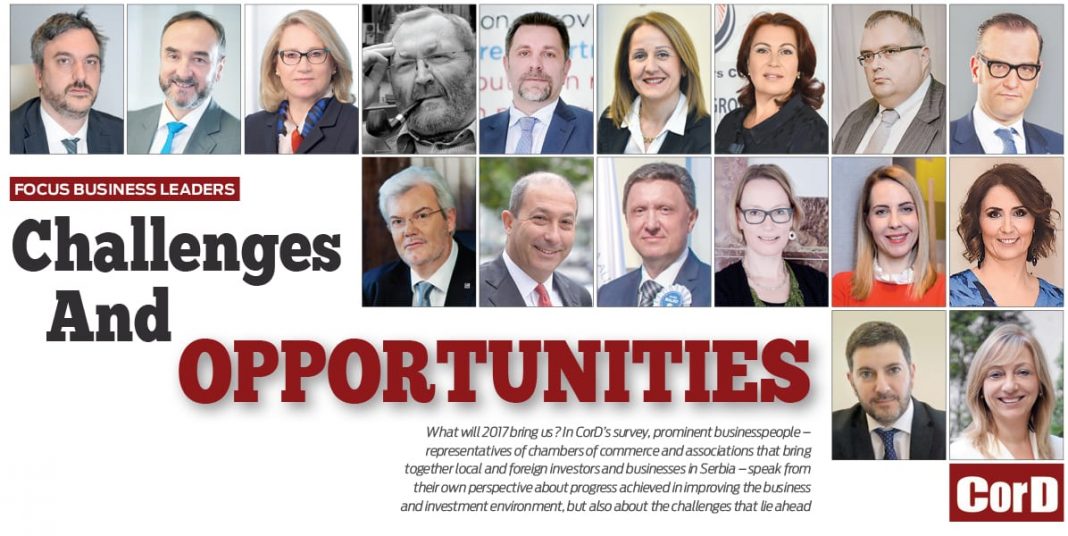Accelerated reforms, particularly those in the area of improving the business climate, ensure that the opinions of business associations are more important than ever. The increasingly open and constructive dialogue between the government and business leaders, which also resulted in Serbia making continuous progress on the World Bank’s ’Doing Business’ list, compelled us to set aside space in the New Year’s edition of CorD for the comments of presidents of chambers of commerce and organisations, business clubs and associations that bring together members of industry, NGOs and representatives of the local community
For the New Year’s edition of CorD magazine, we asked our prominent readers the following questions:
1. What will be in the focus of your chamber in 2017?
2. How do you cooperate with other mixed chambers in Serbia and what do you expect from the CCIS’s Council of Mixed Chambers?
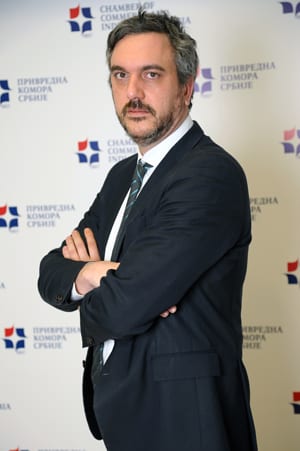
Represent the Economy Through Constructive Dialogue
In the coming year, we will intensify our activities in the process of representing the economy so that we can, through a constructive dialogue with the government and relevant state institutions, best utilise all mechanisms and instruments of the unified chamber system, which begins operating as of 1st January 2017
From the legal right to give our opinion on draft laws and other economy-related regulations, via quarterly analysis of the practical implementation regulations, to the working groups we have formed with most ministries in order to be able to jointly analyse initiatives and solve the problems of businesspeople. We have formed the CCIS Legal-Political Department as the central point for collecting, processing, refining and creating the balanced interests of the economy.
The list of priority tasks still includes strengthening the chamber’s service role: improving existing services and creating new services and standardised service packages; first and foremost continuing digitisation, but also lowering services and public authorisation from the central level to the regional one, in order for us to bring those services closer to businesspeople; forming regional centres of competence etc. We are continuing activities on the introduction of dual education, while plans also include the establishment of our Business Academy.
Providing support to the internationalisation of the economy will continue to be one of the chamber’s key roles. Alongside bilateral forums accompanied by B2B meetings and the organising of day events our suppliers aimed at helping our companies join the supply chains of foreign companies, in 2017 we will also enable businesses to make organised appearances at as many as 18 international and regional fairs. We are working in parallel on strengthening analytical and advisory support to companies seeking to market goods and services on foreign markets, as well as developing a future concept for representing the economy worldwide.
In the past few months since its establishment, the Council of Mixed Chambers has shown itself to be very useful platform for the mutual exchange of information and initiatives, as well as open, constructive and high quality dialogue with the Government and state institutions, enabling us to jointly and regularly discuss proposals and solve the problems of businesspeople. Council members had the opportunity to exchange views on current issues and problems in doing business with the top representatives of state bodies and institutions (the ministers of finance, the economy, labour and employment; the director of the tax administration), but also to voice their opinions on measures and regulations already being prepared, thereby influencing the shaping of the economic environment. We also launched our first joint initiatives…
Apart from that, our goal is to contribute, through the complementary activities of the CCIS and the members of the Council, to develop economic cooperation, increasing the influx of foreign investment and exports, helping to create a local network of suppliers for foreign corporations… The introduction of dual education is also in the common interest of our members, as is the active participation of businesses in the European integration process.

Dedicated to a Better Business Environment
AmCham Serbia traditionally conducts an annual survey among its members with the goal of identifying key reforms necessary to improve the business environment, provide economic growth and increase employment in Serbia
The results of this survey represent AmCham’s contribution to the identification of regulatory bottlenecks that the government needs to tackle if it is to ensure future growth opportunities for existing businesses and make the case for new investments. The results of this year’s survey show moderate satisfaction with the business environment and expectation of improvements in the next four years among 68 per cent of our members. In order to achieve those improvements, we identified priority areas on which we will focus our efforts: increasing the predictability of amendments to tax legislation, reducing the parafiscal burden and tax reform; curbing the shadow economy and state administration reform aimed at reducing bureaucracy. We will also encourage the further development of eGovernment, as one a means of increasing the efficiency of state administration, the introduction of trade facilitation measures and support for education and healthcare reforms. So, in 2017 we will continue to focus on shaping public policy with regard to these issues and thereby contribute to improvements to the overall business environment through constant and open dialogue with the Government of Serbia.
Together we represent the mechanism for the transparent involvement of the private sector in the creation of strategies and proposals for good regulations and efficient law enforcement
The American Chamber of Commerce in Serbia is dedicated to establishing a broad platform of cooperation to support economic reforms for a better business environment. Continued dialogue between the private sector and the Government is crucial for a business-friendly regulatory framework. I am certain that we all have a common goal: to ensure that Serbia continues to be appealing for foreign investors and to encourage current investors to continue investing. The government and businesses should work with the maximum level of cooperation and AmCham and other chambers in Serbia are important platforms for such cooperation. Together we represent the mechanism for the transparent involvement of the private sector in the creation of strategies and proposals for good regulations and efficient law enforcement.
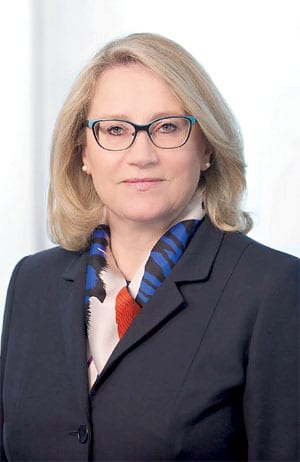
New Year of Optimism
Our first AUSTRIA CONNECT Southeast Europe conference in Belgrade will definitely be a highlight next year, not to mention our ongoing project to introduce elements of the Austrian model of dual vocational training to Serbia
We are planning a series of meetings and events that will hopefully contribute to further developing our already very close economic and trade relations. Our particular focus will be on new companies, startups or companies that don’t yet have any business in Serbia. This requires not only a lot of informative work on our side but also a set of new services in order to even better serve the needs of these companies.
Just as an example: we recently started to host webinars on business topics in Serbia, a very useful and efficient tool to generate interest and offer hands-on advice. Another way to attract more companies from Austria is to organise regional business missions, i.e. missions that cover more than one country in the Western Balkan region in a very efficient and time-saving manner.
Apart from our participation in various trade fairs in Serbia, we will also invite Serbian companies to trade events in Austria, for B2B-meetings and visits of outstanding companies and projects. Furthermore, our first AUSTRIA CONNECT Southeast Europe conference in Belgrade will definitely be a highlight next year, not to mention our ongoing project to introduce elements of the Austrian model of dual vocational training to Serbia. We are very excited to see the results of the first completed year of training and schooling in 2017.
We have always had very good but rather informal relations with other bilateral chambers based on an ongoing exchange of ideas and experiences. This is why we are very pleased that under the leadership of Marko Čadež, CCIS President, the Council of Mixed Chambers has been established as a permanent platform for open and constructive dialogue with the government and state institutions. Our experience so far shows that this is a very effective body and we have already seen substantial results. We are very much looking forward to continuing our cooperation within this Council.

Contributing to Serbia’s Development
Serbia’s EU accession process induces a rapid sequence of changes to laws and regulations. To keep our members abreast of these changes, we will continue to bring relevant speakers and topics that might have an impact on their businesses environment
The year 2016 was marked by the BSBA co-establishment of the European Initiative (EI) working group and subsequently the Council of Mixed Chambers, while 2017 will be a year to continue our involvement in these initiatives. With the support of our corporate members, we will continue our supporting efforts aimed at improving the business environment for SMEs. Our working lunches with prominent speakers and the successful Belgian Day at the CCIS have been highly appreciated, showing that we have to continue in the same direction.
We are inspired by our members, as we do not only want to inspire them but also want to be inspired by them. The BSBA will follow the business environment changes in the country as closely as possible. The EU accession process induces a rapid sequence of changes to laws and regulations, which have been contributing to the improvement of the business environment.
To keep our members abreast of these changes, our working lunches will continue to choose relevant speakers and topics that might have an impact on their businesses environment. No one will deny that a lot still has to be done, but Serbia is on the right track. However, one should not wait for the miracle of “growth” to happen, it is rather the reverse: contributing to small-scale local development, encouraging and supporting prospective SMEs to prudently invest, and creating modest but real perspectives for prosperity.
The EI started as a working group of European Bilateral Chambers and business associations and close cooperation with the CCIS was immediately envisaged. This quest for cooperation soon developed into the CCIS’s proposed Council of Mixed Chambers. The BSBA, as one of the first to endorse the EI, also endorsed the CMC. We appreciate very much the work undertaken by the CCIS on this matter.
So far we have had, besides the “founding assembly”, three working meetings which proved to be pretty fruitful, resulting not only in the formulating of recommendations for amendments to laws and regulations but also in explanatory meetings highlighting the government’s enhanced strategies and priorities. The BSBA is an active participant in these meetings. The CMC is bringing bilateral chambers and business associations in the country closer together. The Belgian motto “Unity makes strength” is certainly in the right place here.
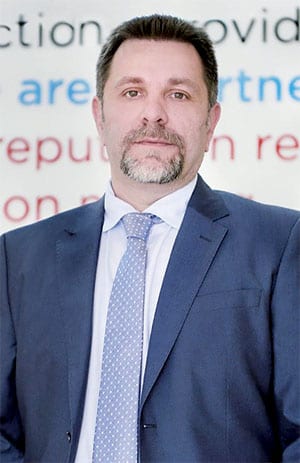
Canadian Education For Serbian Competitiveness
By bringing the LEADER Project to Serbia, we began an important part of our future activity in the field of education. We are proud to say that we were invited to organise the same project in 2017 and, hopefully, bring other similar Canadian educational programmes to Serbia
By promoting quality, know-how, high working ethics, high standards in health & safety – all of which are attributes of the Canadian way of doing business – we have been on a mission to improve the competitiveness of Serbia on the world map and make it a better place for doing business since the first day of our existence. It is our belief that a major part of this goal can be achieved through education.
The year 2016 was marked for CANSEE by the LEADER Project, the Canadian two-week educational programme, secured via a partnership between CANSEE and the Richard Ivey School of Business, University of Western Ontario, Canada, which we organised in Serbia for the first time. It was our idea to give our members an opportunity not just to network, but also to familiarise themselves with the Canadian way of learning through case studies.
By bringing the LEADER Project to Serbia, I believe we started an important part of our future activity in the field of education. We are proud to say that we were invited to organise the same project again next year, and hopefully, we will bring other similar Canadian educational programmes and seminars to Serbia. We will also continue, through different types of networking events, workshops and seminars, together with the Canadian Embassy, as our valued partner, to enable the efficient exchange of business information among our members.
We promote quality, knowhow, high working ethics and high standards of health & safety – all of which are attributes of the Canadian way of doing business
CANSEE has good cooperation with other mixed chambers in Serbia, and we believe those relationships will reach an even higher level now, following the constituting of the Council of Mixed Chambers. We have recognised the importance of the Council and the possibilities it offers, and are on our way to becoming one of its members. It is important to have that kind of platform, as a direct way to discuss with representatives of ministries, the tax administration etc., all of the important issues that our members face in their day-to-day business. This will, we believe, accelerate important structural reforms in Serbia and improve the business climate in this region.

We’re Strengthening Contacts And Seeking New Partners
Our priority goals in 2017 are to increase the number of members and strengthen connections among current members, as well as establishing wider collaboration with local governments, considering that there are still a lot of cities with which we should establish business contacts
The Croatian Business Club in Serbia has existed for ten years already, primarily with the aim of exchanging information, experiences and ideas among members – businesses that operate in Serbia, whether they are Serbian or Croatian companies, or business partners from other countries which have representative offices are in Serbia. Through the advancing of cooperation between companies, our long-term goal is to promote economic cooperation between Croatia and Serbia by encouraging trade and investment.
One of the priority plans in 2017, apart from increasing the number of our members and strengthening connections among current members, will be to establish wider cooperation with local governments: such cooperation already exists with some cities, but there are still a lot of cities with which we should establish business contacts. It is our intention to help SMEs recognise the opportunities brought by membership in our club. We plan to inform as many businesses as possible about these opportunities through social networks, where we appeared during mid-2016.
During 2016 the Croatian Business Club, together with representatives of 12 other countries, signed an agreement with the Chamber of Commerce & Industry of Serbia on the establishment of the Council of Mixed Chambers. This was the first step – establishing a platform for the development of long-term cooperation among the signatory countries. That will be a place where we expect members of the international business community that are active in Serbia to come closer together in the sense of joint projects. We hope that a joint action plan will soon be established, and, as was stated during its founding, that there will also be joint activities aimed at attracting foreign investment.
Our business club, like most similar clubs from other countries, was established in order to improve the business climate in the country in which it operates – our goal is not only to strengthen the corporate position of foreign companies on the Serbian market, but rather common benefits for both countries, and particularly for the community in which we operate.
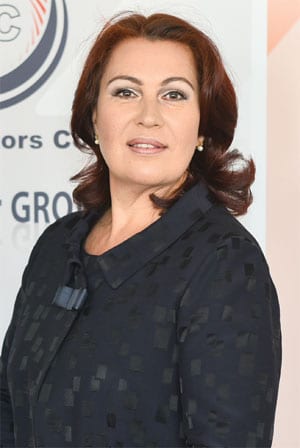
Improving The Business Climate With Expert Knowledge
The Foreign Investors Council recently launched the latest “White Book”, in which we pointed out the areas that were marked by progress from October 2015 until October 2016, and those that weren’t and will, therefore, be priority areas of our association for the next year
The most progress was marked in the field of real estate and four areas of the general legal framework, including competition and consumer protection, state aid and notaries, as well as in the sectors of telecommunications, oil and gas, and private security. The least progress was marked in taxes and labour regulations, and three areas of the general legal framework – forex, bankruptcy and whistleblowers regulations, as well as in the sectors of food and agriculture, insurance, and the home care and cosmetic products industry. The FIC’s three main expectations from the Government are that it will accelerate structural reforms and cut bureaucracy, improve the implementation of laws and continue harmonising laws with the EU Acquis.
When it comes to the FIC cooperates with other chambers in Serbia, I would like to highlight that we are eager to cooperate with all relevant players in this market who share our main goal, which is to contribute to the improvement of the business climate with expert knowledge. Our strength comes from the fact that the FIC is growing continuously, currently bringing together over 130 companies that have invested over €28.7 billion and directly employ over 94,000 people in Serbia.
We highly appreciate our independence, while at the same time being ready to cooperate on an “ad hoc” basis for the benefit of our members. We welcome the initiative of the CCIS to share experiences with us and other colleagues, but the FIC is not a member of the Council of Mixed Chambers and only attends the Council’s meetings as an observer. The FIC membership will decide whether to join this alliance at the upcoming Assembly meeting on 21st December. In the meantime, we will continue providing proposals aimed at supporting the growth of business activities and improving living standards for Serbian citizens.

Doors Open Wide For Cooperation
With the organising of forums and meetings with government officials, but also renowned French groups, the doors are wide open for the development of French-Serbian economic cooperation, which we expect to be intensified during 2017
Based on the results of the activities that we carried out in 2016, we can conclude that in Serbia there is a great interest and need for French expertise, primarily in the area of public-private partnerships, sustainable infrastructure projects, public transport and environmental protection. We could also see this, among other things, through the important political meetings that took place during the year. The opening of the chapter covering public-private partnerships in the framework of Serbia’s EU accession negotiations should soon come on the agenda.
At the end of the year, important talks were also held with the top political representatives of both countries on the project to build a metro rail system in Belgrade. With the organising of forums and meetings with government officials, but also renowned French groups, the doors are wide open for the development of French-Serbian economic cooperation. As such, we expect these relations to be intensified during 2017 and the increased presence of French experts and French companies in Serbia. Our mission is to be the coordinator of these relations and to contribute to improving economic cooperation between our two countries.
The cooperation we realise with other European chambers and all other foreign chambers, as well as with the CCI of Serbia, is at a very high level
The cooperation we realise with other European chambers, but also all other foreign chambers, as well as with the Chamber of Commerce & Industry of Serbia, is at a very high level. Our cooperation is intense and open, all with the aim of improving the business environment in the country and our desire and responsibility to convey the world’s best practices.
We regularly organise joint events. Thus we recently organised a business working lunch with European chambers of commerce in Serbia on the topic “Effects of digitisation on the labour market: challenges and opportunities for women”, at which we hosted Dragan Djermanović, an expert on using the internet for business. In the second half of December, we organised a new Speed Business meeting with the Italian-Serbian Chamber.
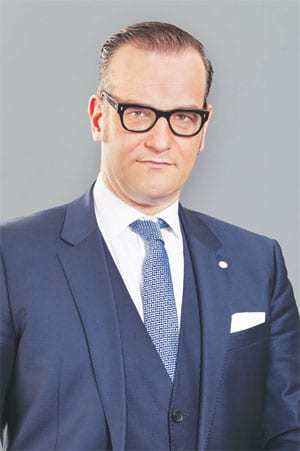
Working Together on Real Life Changes
Businesspeople, who make up our Chamber, are by default the most enterprising members of society. I believe that our German-Serbian entrepreneurship will become rather visible and cost-effective as early as next year, not only for our Chamber but primarily for Serbia
The German-Serbian Chamber of Commerce, the first bilateral chamber, was founded nine months ago, as the most natural continuation of the already successful practices in economic cooperation between Germany and Serbia. Economic and development cooperation between the two countries is the most intense part of our economic relations, and Germany is the biggest single donor.
On the other hand, the 300 companies that are members of the Chamber, and the 30,000 people employed by those companies, represents the foundation of partnership – not only with each other but also with Serbian institutions. An important fact is that, according to a survey conducted, more than 90 per cent of German companies operating in Serbia would invest in the country again, which primarily reflects their trust in institutions.
When we decided to establish the Chamber, the original idea was not that our members should fight a battle for their own interests. The point was that we should work in a partnership with the Government of Serbia and state institutions on the improvement of the economic environment and initiate changes on our own. In this sense, we are particularly involved in the implementation of dual education in Serbia, considering that we have good and extensive experience in that field in Germany.
I am also sure that the project ‘German Initiative for Finding Suppliers in the Countries of the Western Balkans’ will be implemented for the third year in a row. The aim is for related companies from Germany and Serbia to meet directly and thus easily establish business contacts that may be of long-term interest. Of course, there is also Serbian Visions, a multi-congress that has already become a tradition. I am a very practical man and I think that plans make sense only if founded in real life. Businesspeople, who make up our Chamber, is by default the most enterprising members of society. I believe that our German-Serbian entrepreneurship will become rather visible and cost-effective as early as next year, not only for our Chamber but primarily for Serbia.
The point of associations lies exactly in cooperation and the strengthening of that cooperation. The economy has its particular interests, but there are also common interests that, in order to be achieved, have to be supported by joint actions and attitudes. Having been reformed, the Chamber of Commerce & Industry of Serbia became ‘the privileged advisor to the Government’ and ‘spokesperson’ of the entire economy of the country. This is very important because all of the attitudes, thoughts and ideas come together in one place, where a common position of the economy is articulated. Let me simplify that by saying that draft laws are debated at the Chamber of Commerce & Industry of Serbia. These drafts are sent to the Council of Mixed Chambers, which submits an opinion following a debate. That is very important for us because we formulate our positions in an institutionalised manner, which then, also through institutionalised channels, reach the table of the one who proposed them.
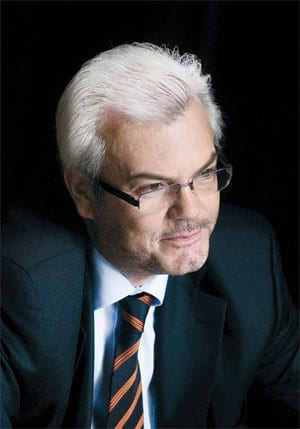
Mutually Beneficial Cooperation
One of the priorities of the HBA will be to lobby actively for Serbia as an ideal destination to attract new Greek investments, which will be beneficial for both Greece and the Serbian economy
What we will certainly work on with the most dedication is increasing the number of members of the Hellenic Business Association and strengthening ties between them, as well as further strengthening relations between the Association and state institutions. We also insisted on this in the previous period. At the same time, we also have the ambitions aimed at achieving better and stronger economic relations between the two countries.
Our priorities also include greater visibility of the Association’s activities in the media, as well as actively lobbying for Serbia as an ideal destination to attract new Greek investments, which will be beneficial for both Greece and Serbia. We also hope to play a more active advisory role in Serbia’s efforts to join the EU, as well as in its efforts to harmonise local legislation with appropriate European Union regulations.
Cooperation with the business associations of other countries in Serbia was intensified significantly in 2016 compared to the previous period. Organising “speed meetings” proved to be a very good form for meeting and establishing cooperation. We organised such meetings with the Swiss-Serbian Chamber of Commerce, AmCham, the Slovenian Business Club and the Nordic Business Alliance, while with the Chamber of Italian-Serbian businesspeople and the French-Serbian Chamber of Commerce we organised networking receptions.
I would particularly highlight the B2B meetings organised by the Hellenic Business Association of Serbia, the Department for Economic and Trade Affairs of the Greek Embassy in Belgrade and the Chamber of Commerce & Industry of Serbia, entitled “Open Doors Day for Greece – Possibilities of bilateral cooperation”, at which opportunities for bilateral business cooperation were presented and which included the participation of 40 Greek and more than 100 Serbian companies. The most recent in the series of activities in this field was the Business Women’s Lunch, which was organised in cooperation with various chambers of commerce of European countries.
I see the establishment of the Council of Mixed Chambers as an excellent move when it comes to bringing together and connecting the international business community in Serbia with the Chamber of Commerce & Industry of Serbia, as an umbrella organisation. I expect the Council to primarily be a link between foreign companies operating in Serbia and the Government of the Republic of Serbia and its ministries, all with the aim of improving the business environment. I see this as an ideal tool for constructive dialogue, which on the one hand means familiarising members of the Council with new laws that are being prepared and which relate to daily operations, and feedback on the challenges that foreign companies face in pursuing their business in Serbia, in terms of economic and legal processes, on the other hand.

Mixed Council Should Represent a Truly Open Forum
As Serbia is progressing in the process of preparing to enter the EU, in 2017 we expect further growth in bilateral economic cooperation between the two countries
As a consequence of growth, we expect some increase in the business activity between Italy and Serbia and some increase in our activity. The ISCC’s mission is to support bilateral economic relations between the two countries. Serbia has been, and remains, in the focus of Italian investors’ interest. We also observe increasing interest among Serbian companies in expanding their relationship with the Italian market, both as suppliers to local manufacturers or distributors to consumers. In both cases, the ISCC can support them with a wealth of contacts and experience.
In order to be effective, the ISCC will focus on fewer “core” activities. In fact, in pursuing this ambition of developing relations between Italy and Serbia there is a risk of running after every idea. The focus will be on direct support to the business and commercial activities of our current members, Serbian and Italian companies and institutions. Then we aim to enlarge the membership base and include institutions located across the whole country, and not only in the more traditional development areas.
Even before the formation of this Council, we have been cooperating for a long time with many mixed chambers operating in Serbia through a number of joint initiatives. The recently established Council of Mixed Chambers represents a very interesting opportunity to talk with the Chamber of Commerce & Industry of Serbia and the Serbian Government in a more coordinated way. We expect a positive contribution, but we also know that we will need to contribute to that body ourselves. I hope this Council will really be managed with the aim of representing a truly open forum to discuss and make certain new pieces of legislation more suitable for our companies.
However, it must also be noted that the ISCC will continue to build its bilateral relations with the other mixed chambers, as they reflect broader relationships that exist between our countries, as well as some excellent personal relationships among the respective representatives in Serbia.

Expertise – The Basis of Success
NALED has had stable and clearly defined goals for many years, which resulted in us step-by-step forming a serious group of experts with adequate resources as a precondition for successfully resolving identified problems
Our interests for the next year will continue to be predominantly linked to the fight against the shadow economy and the introduction of eGovernment. The Serbian Government has declared next year the Year of the Fight Against the Shadow Economy and all stakeholders have the major responsibility of successfully implementing the measures of the National Programme. Likewise, the great success achieved in the first year of the application of electronic building permits is proof that there are a willingness and know-how to improve the efficiency, accountability and transparency of the administration. Ahead of us is a mammoth challenge in which we can only approach our goal through persistent and systematic work. We have the broad support of both the citizens and the government, but in real life, the fight against the shadow economy and efficient eGovernment represent an encroachment on someone’s financial interests, and that has never gone easily and painlessly.
We will also work on certifying local governments with a favourable business environment in Southeast Europe (BFC SEE), because through this programme we see the promotion of good examples which need to use their efficiency to encourage those that are less successful, while on the other side we also see the possibility of re-establishing severed economic ties in the region, to the satisfaction of all programme participants.
There is also work on our internal organisation, where we will gather in the forums of the alliance our members on the basis of their preferences, all with the aim of creating adequate proposals for improving Serbia’s business environment.
NALED has some elements of a chamber, but it is not a proper chamber, so we are not members of the Council of Mixed Chambers, but we have very good cooperation with other organisations.
We are all here on the same task, with some minor specificities, which enables us to coordinate our activities or conduct them jointly, and that will also be the case next year.
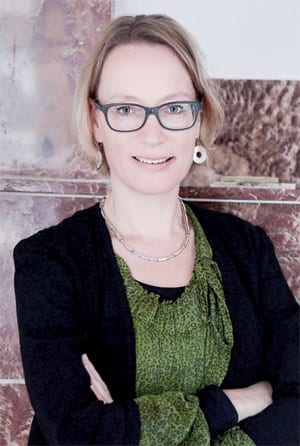
Building a Resilient Future Together
In 2017 we will provide a wide range of support activities to Dutch businesses operating locally and those seeking to expand on the markets of Serbia and Montenegro, as well as focusing on activities that should result in stronger relations in the fields of renewable energy and water management
The Dutch Embassy will continue intensifying the already good economic collaboration with Serbia and Montenegro, especially in the field of agriculture. In 2017 we will also provide a wide range of support activities to Dutch businesses operating locally and those seeking to expand on the markets of Serbia and Montenegro. Next year we are going to focus even more on activities that should result in stronger relations in the fields of renewable energy and water management. When it comes to energy, we would like to support Serbia is having a more independent and diverse energy sector and higher energy efficiency. The same goes for water, an area in which – also due to the geographical location of our country (below sea level) – we have lots of expertise and are internationally renowned for our water management. We would like to help Serbia to be even more resilient to water-related natural disasters and to provide the necessary know-how and technology to tackle challenges related to wastewater treatment and other environmental topics (Chapter 27 of the acquis).
Our Embassy strongly relies on partnerships and mutual collaboration. We often cooperate not only with other embassies, the World Bank, the EBRD and EIB but also with domestic investor associations and chambers. We have close relations with the Foreign Investors Council, NALED, SKGO, the Serbian Association of Managers and, of course, the Chamber of Commerce & Industry of Serbia. We believe that mutual trust and public-private dialogue are the essences of a sustainable and functional business environment, and we gladly contribute to that, together with our companies.
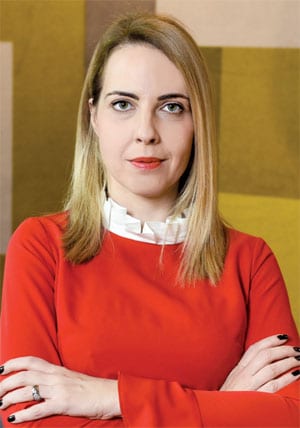
Dialogue for a Better Business Environment
Cooperation between the business community and governmental stakeholders remains high on the agenda of the Nordic Business Alliance for 2017. That includes our annual dialogue with the Prime Minister and cooperation with the Economic Caucus of the National Assembly
In 2017 the Nordic Business Alliance will maintain its strategic orientation to connect Nordic and Serbian companies and to bring more investments, but also to promote Nordic values and good practices in Serbia. In addition, cooperation between the business community and governmental stakeholders remains high on our agenda. We plan to continue with our annual dialogue with the Prime Minister, in order to discuss innovations, the business environment and the legal framework. We will also continue cooperation with the Economic Caucus of the National Assembly. I am proud of the results of these initiatives because together with the state we are managing to improve the business framework, which will generate shared value for the citizens and the entire business community.
As in previous years, the NBA relies on high involvement and partnership with all Nordic embassies in Serbia. Their support is incorporated into our growth and success.
For us, 2017 will be marked by ecology and sustainability development. We are planning some projects in this area aimed at raising awareness and implementing good solutions in our community.
The Nordic Business Alliance has good relations with other bilateral chambers and business associations and we hope that in the period ahead our cooperation will be expanded.
There are a lot of chambers in Serbia that represent investors from different countries and regions, but all of these organisations are connected by the same goal – improving the business climate and enhancing economic cooperation and growth. I see a diversity of experiences as a factor that is going to accelerate further development of the market economy.
As an excellent example of cooperation, I would mention the Speed Business Meeting event that was organised jointly by the NBA, the Hellenic Business Association and the Slovenian Business Club. This networking event was attended by 35 companies, which had a chance to connect with potential business partners.
We also welcome the establishment of the CCIS’s Council of Mixed Chambers and the NBA is willing to play an active role in this body. My expectation from the Council is for it to become a platform that can bring synergy and increase the influence of bilateral chambers in the expected continuation of structural reforms.
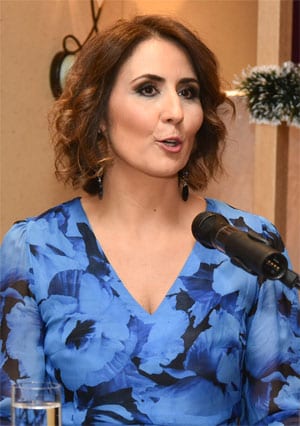
Our Members’ Needs Are Our Top Priority
We are focused on securing added value for our members through the various activities of the club and joint work with other business associations on improving opportunities for the development of business
As has been the case to date, in 2017 the type and intensity of the activities of the Slovenian Business Club will depend primarily on the recommendations and wishes of its members or the needs that have been identified as priorities. In our ranks are companies from a wide range of sectors, and from this diversity and number of members comes diversity and abundance of needs, wants and desires.
The number of members of the Club has been increasing constantly in the last three years. That’s why it is essential to intensively monitor the reasons why companies join us, as well as additional efforts to respond to all of their demands. All those who are members of the Slovenian Business Club need to get additional value from their membership. Clubs like ours were created due to a need for companies to organise themselves on a market and to work together to improve conditions for doing business. Our members are of course aware that it is precisely working together that brings benefits for everyone and legitimises the existence of such a club. The task of the management is to constantly encourage members of the Club to share ideas and propose activities, to collect ideas and suggestions and implement them in practice or assist in their implementation.
The Slovenian Business Club is in regular contact and cooperates very closely with the Chamber of Commerce & Industry and other institutions in Serbia. We also nurture honest partnerships and even friendly relationships with other foreign business clubs, chambers and associations operating in Serbia. We are signatories of the agreement on the establishment of the Council of Mixed Chambers, with the aim of strengthening cooperation and communication between state institutions and our members. The establishment of the Council brought us a step closer to achieving positive effects, both in terms of mutual cooperation between business associations and in communication and cooperation with Serbia’s state institutions. Unfortunately, there is still a practice whereby a large number of state institutions do not respond promptly to various queries from companies, so the only thing left for business leaders to do is to direct those same requirements for state institutions through their associations. The silence of the administration slows down and holds back the economy.
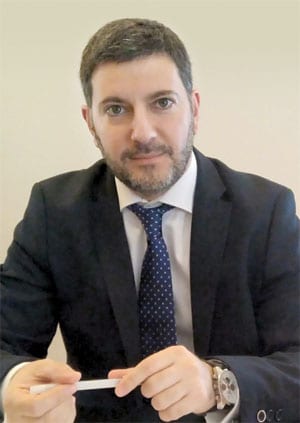
Supporting The Development of Sound Projects
The main aim of the Economic and Commercial Office of the Embassy of Spain in Belgrade is to strengthen economic cooperation between Spanish and Serbian companies and institutions
In this regard, we focus on sectors where Spain has gained international recognition – these are the fields where we can support Serbia most effectively. The year 2016 has been an excellent one for bilateral exchanges, which grew at a monthly average of 15-20 per cent. In 2017 we will try to accelerate this pace even more with new efforts. Agriculture will have a special place in our activities. Spain is the world’s eighth-largest exporter of agricultural products, thanks to our competitive edge in technologies like irrigation, greenhouses, crop protection or anti-frost techniques. We will have a national pavilion at the Novi Sad Agriculture Fair and will organise several other activities. The environment, and especially the water sector, is also dear to us. Spain is Europe’s leader in water management policies and technologies and we try to support Serbian municipalities in developing sound projects. We also help to form mixed Serbian-Spanish consortia to implement projects. In addition to this, we will keep sending Serbian companies and officials to Spain, in order to show them the opportunities for cooperation with our country in sectors as diverse as transport infrastructure, agribusiness and wine.
Our aim is to facilitate Serbian and Spanish companies in finding and developing opportunities with the cooperation that is mutually beneficial. In this regard, the new Council of Mixed Chambers will definitely prove a useful tool for enhancing cooperation between domestic and foreign companies
Although we are not a mixed chamber as such, but rather the Spanish institution responsible for promoting bilateral trade and investment, we have longstanding cooperation with many domestic chambers and business associations. Our aim is to facilitate Serbian and Spanish companies in finding and developing opportunities with the cooperation that is mutually beneficial. In this regard, the new Council of Mixed Chambers will definitely prove a useful tool for enhancing cooperation between domestic and foreign companies.
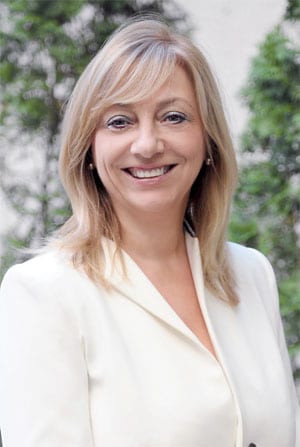
Public-Private Dialogue in Focus
In 2017 we will continue to act as the Voice of the Swiss-Serbian business community towards officials, to promote ‘’Swissness’’ and create new networking opportunities for members
The Swiss-Serbian Chamber of Commerce today brings together approximately 70 member companies. In 2017 we will continue to act as the voice of the Swiss-Serbian business community towards officials and to develop the public-private dialogue with both Swiss and Serbian authorities. In order to achieve this goal, the SSCC’s focus will be on maintaining effective communication with members as part of our efforts to contribute to the further improvement of the local business environment.
The SSCC has also recognised the importance of the SME sector for strengthening Swiss-Serbian business relations. As such, we will continue to support local SMEs by providing them with adequate guidance to develop their business activities in Switzerland. At the same time, the SSCC plans to develop activities in Switzerland, with a view to raising awareness of the existing business potential on the Serbian market. In addition, the SSCC will strive to contribute to the development of dual education in Serbia.
We will continue to support local SMEs by providing them with adequate guidance to develop their business activities in Switzerland
To conclude, in 2017 the SSCC will continue to implement activities orientated towards fostering Swiss-Serbian economic ties, towards promoting the concept of “Swissness” and creating new networking opportunities for members. As always, our action plan will be defined on the basis of input provided by SSCC members in our annual survey, which will be conducted at the beginning of 2017.
The SSCC cooperates actively with other bilateral chambers of commerce in Serbia. For example, in April 2016 the SSCC co-organised the “Speed Business Meeting” with AmCham Serbia and the Hellenic Business Association.
With regard to the CCIS’s Council of Mixed Chambers, we were pleased to learn that the Council would be bringing together the international business communities that are active in Serbia, with the aim of attracting more foreign investors to the local market and better positioning Serbian companies on the international market. The SSCC is looking forward to working with the Council on a project basis and contributing to attracting more Swiss investors to Serbia.
